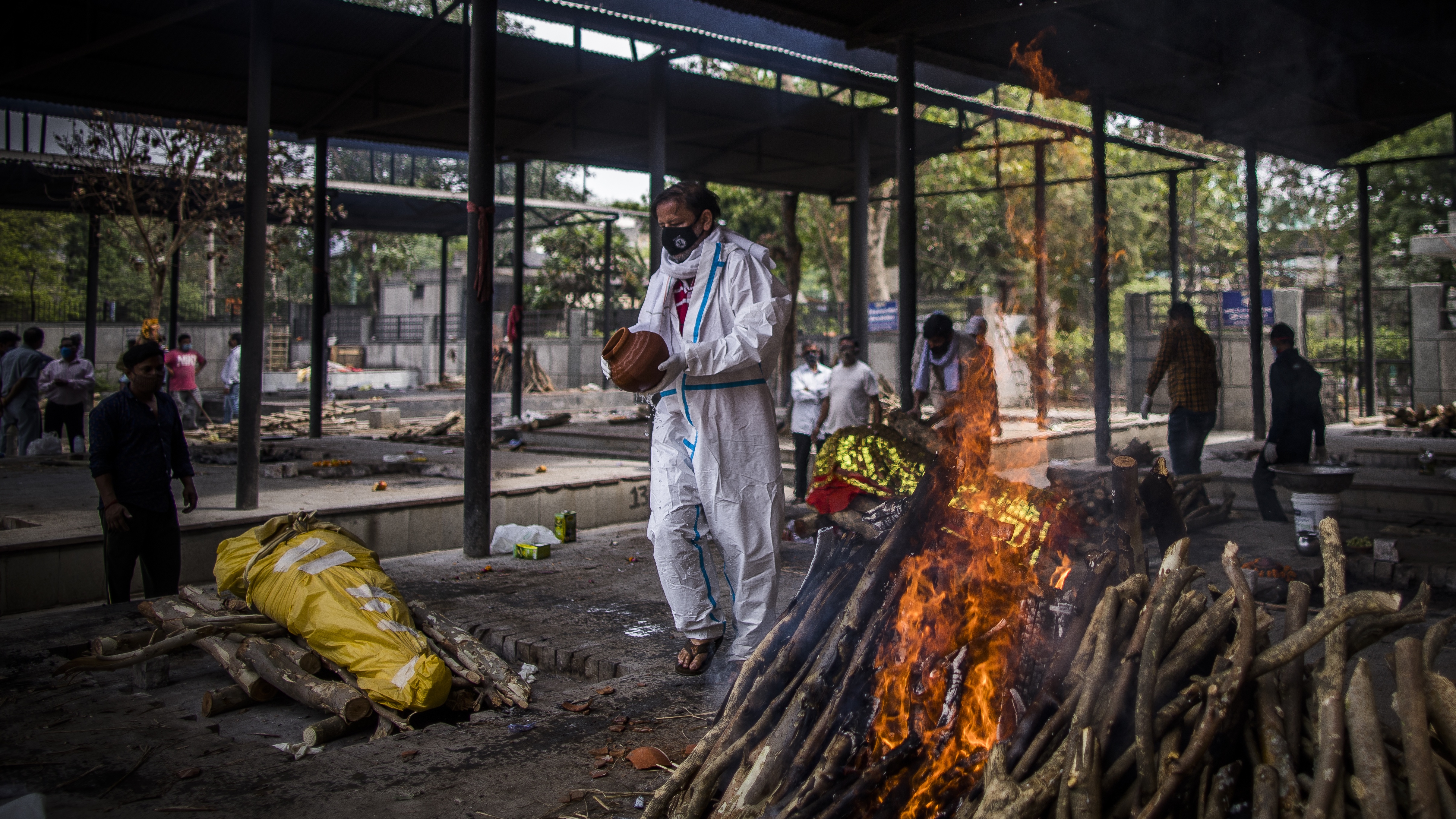India’s true Covid deaths ‘in the millions rather than hundreds of thousands’
New study findings fuel claims that government is deliberately under-reporting pandemic fatalities

A free daily email with the biggest news stories of the day – and the best features from TheWeek.com
You are now subscribed
Your newsletter sign-up was successful
The number of excess deaths in India during the global Covid-19 outbreak may be up to ten times higher than the official count, according to a major new study.
Researchers at the US-based Center for Global Development (CGD) used “three different sources of data” in an effort to “piece together one of the most comprehensive pictures yet of the pandemic in India”, The Guardian reports. The experts estimate that the number of excess deaths - a calculation of how many more people than usual are dying across a set period of time - was between 3.4 million and 4.7 million in India between January 2020 and June 2021.
The country’s official Covid death up to the end of last month was about 400,000. But “the reality is, of course, catastrophically worse”, the report authors write. “What is tragically clear is that too many people, in the millions rather than hundreds of thousands, may have died.”
The Week
Escape your echo chamber. Get the facts behind the news, plus analysis from multiple perspectives.

Sign up for The Week's Free Newsletters
From our morning news briefing to a weekly Good News Newsletter, get the best of The Week delivered directly to your inbox.
From our morning news briefing to a weekly Good News Newsletter, get the best of The Week delivered directly to your inbox.
‘Not an outlier’
The researchers compared data from the civil registration system that records births and deaths in India; blood tests showing the prevalence of the virus nationwide; and an economic survey of nearly 900,000 people done three times a year.
The conclusions reached from this analysis “undermine India’s claim to have one of the world’s lowest deaths per capita”, The Guardian says.
The experts say that while India’s second wave of infections - which hit in March - was worst than the first, this initial outbreak last year was also “more lethal than is widely believed”, with as many as two million Covid deaths.
A free daily email with the biggest news stories of the day – and the best features from TheWeek.com
To date, the South Asian nation has officially recorded more than 414,000 fatalities related to the coronavirus.
While stressing that the available data had “merits and shortcomings”, study co-author Arvind Subramanian says that the research findings strongly suggest that “India has not been an outlier” in terms of mortality, as has been claimed by the authorities. Instead, the country has experienced “mortality not dissimilar from countries of comparable size and infections”, he told the BBC’s India correspondent Soutik Biswas.
“After the first wave, which was more spread out, there was a sense that India had escaped the worst because there was this undercounting of deaths, and that led to a culture of complacency,” said Subramanian, former chief economic adviser to the Indian government, in separate remarks reported by The Guardian.
“But in the second wave, with all the horrendous images that we saw, that really galvanised Indian society to get to the bottom of the numbers. Much of this is thanks to the heroic efforts of Indian journalists and civil society who tirelessly and furiously recorded deaths and forced state governments to release accurate data and revise their figures.”
‘Worst human tragedy’
The Indian government has repeatedly “dismissed” concerns that the country’s true death count has been dramatically under-reported, describing the claims “as exaggerated and misleading”, Al Jazeera reports.
But “most experts” believe India’s official toll “is a vast undercount”, the broadcaster continues. The report by Subramanian and two other CGD researchers “said the count could have missed deaths occurring in overwhelmed hospitals or while healthcare was delayed or disrupted, especially during the devastating second wave”.
Meanwhile, the experts write, the true impact of the first wave was probably underestimated “because it was spread out in time and space, unlike the sudden and concentrated” second surge in infections.
But ultimately, the most “critical take-away, regardless of the sources and estimates”, is that actual Covid deaths are “likely to be far greater than the official count”, they warn.
Amid growing calls for accountability, “several Indian states have recently revised their Covid-19 mortality figures”, resulting in a sudden and sharp uptick in India’s death toll, The Guardian reports.
Previous under-reporting has also been blamed on “the stigma attached to the virus” that has “prevented many people getting tested”, causing many deaths to go “unrecorded as Covid-19 fatalities”, the paper adds.
But the reality is that the pandemic is “arguably India’s worst human tragedy since partition and independence”, says the CGD report.
The partition of the Indian subcontinent into independent India and Pakistan in 1947 following the end of British rule triggered the killing of up to two million people, as Hindu, Sikh and Muslim groups fought to claim territory.
Joe Evans is the world news editor at TheWeek.co.uk. He joined the team in 2019 and held roles including deputy news editor and acting news editor before moving into his current position in early 2021. He is a regular panellist on The Week Unwrapped podcast, discussing politics and foreign affairs.
Before joining The Week, he worked as a freelance journalist covering the UK and Ireland for German newspapers and magazines. A series of features on Brexit and the Irish border got him nominated for the Hostwriter Prize in 2019. Prior to settling down in London, he lived and worked in Cambodia, where he ran communications for a non-governmental organisation and worked as a journalist covering Southeast Asia. He has a master’s degree in journalism from City, University of London, and before that studied English Literature at the University of Manchester.
-
 The environmental cost of GLP-1s
The environmental cost of GLP-1sThe explainer Producing the drugs is a dirty process
-
 Greenland’s capital becomes ground zero for the country’s diplomatic straits
Greenland’s capital becomes ground zero for the country’s diplomatic straitsIN THE SPOTLIGHT A flurry of new consular activity in Nuuk shows how important Greenland has become to Europeans’ anxiety about American imperialism
-
 ‘This is something that happens all too often’
‘This is something that happens all too often’Instant Opinion Opinion, comment and editorials of the day
-
 A Nipah virus outbreak in India has brought back Covid-era surveillance
A Nipah virus outbreak in India has brought back Covid-era surveillanceUnder the radar The disease can spread through animals and humans
-
 How music can help recovery from surgery
How music can help recovery from surgeryUnder The Radar A ‘few gentle notes’ can make a difference to the body during medical procedures
-
 Covid-19 mRNA vaccines could help fight cancer
Covid-19 mRNA vaccines could help fight cancerUnder the radar They boost the immune system
-
 The new Stratus Covid strain – and why it’s on the rise
The new Stratus Covid strain – and why it’s on the riseThe Explainer ‘No evidence’ new variant is more dangerous or that vaccines won’t work against it, say UK health experts
-
 RFK Jr. vaccine panel advises restricting MMRV shot
RFK Jr. vaccine panel advises restricting MMRV shotSpeed Read The committee voted to restrict access to a childhood vaccine against chickenpox
-
 RFK Jr. scraps Covid shots for pregnant women, kids
RFK Jr. scraps Covid shots for pregnant women, kidsSpeed Read The Health Secretary announced a policy change without informing CDC officials
-
 New FDA chiefs limit Covid-19 shots to elderly, sick
New FDA chiefs limit Covid-19 shots to elderly, sickspeed read The FDA set stricter approval standards for booster shots
-
 RFK Jr.: A new plan for sabotaging vaccines
RFK Jr.: A new plan for sabotaging vaccinesFeature The Health Secretary announced changes to vaccine testing and asks Americans to 'do your own research'